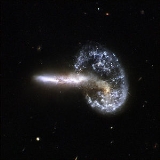
Mayall's Object
Encyclopedia
Mayall's Object is the result of two colliding galaxies located 500 million light years away within the constellation of Ursa Major
. It was discovered by Nicholas U. Mayall of the Lick Observatory
on 13 March 1940, using the Crossley reflector. When first discovered, Mayall's Object was described as a peculiar nebula, shaped like a question mark. Originally theorized to represent a galaxy reacting with the intergalactic medium, it is now thought to represent the collision
of two galaxies, resulting in a new object consisting of a ring-shaped galaxy
with a tail emerging from it. It is thought that the original collision between the two original galaxies created a shockwave that initially drew matter into the center which then formed the ring.
Ursa Major
Ursa Major , also known as the Great Bear, is a constellation visible throughout the year in most of the northern hemisphere. It can best be seen in April...
. It was discovered by Nicholas U. Mayall of the Lick Observatory
Lick Observatory
The Lick Observatory is an astronomical observatory, owned and operated by the University of California. It is situated on the summit of Mount Hamilton, in the Diablo Range just east of San Jose, California, USA...
on 13 March 1940, using the Crossley reflector. When first discovered, Mayall's Object was described as a peculiar nebula, shaped like a question mark. Originally theorized to represent a galaxy reacting with the intergalactic medium, it is now thought to represent the collision
Interacting galaxy
Interacting galaxies are galaxies whose gravitational fields result in a disturbance of one another. An example of a minor interaction is a satellite galaxy's disturbing the primary galaxy's spiral arms. An example of a major interaction is a galactic collision.-Satellite interaction:A giant...
of two galaxies, resulting in a new object consisting of a ring-shaped galaxy
Ring galaxy
A ring galaxy is a galaxy with a ring-like appearance. The ring consists of massive, relatively young blue stars, which are extremely bright. The central region contains relatively little luminous matter. Some astronomers believe that ring galaxies are formed when a smaller galaxy passes through...
with a tail emerging from it. It is thought that the original collision between the two original galaxies created a shockwave that initially drew matter into the center which then formed the ring.
See also
- Ring galaxyRing galaxyA ring galaxy is a galaxy with a ring-like appearance. The ring consists of massive, relatively young blue stars, which are extremely bright. The central region contains relatively little luminous matter. Some astronomers believe that ring galaxies are formed when a smaller galaxy passes through...
- Interacting galaxyInteracting galaxyInteracting galaxies are galaxies whose gravitational fields result in a disturbance of one another. An example of a minor interaction is a satellite galaxy's disturbing the primary galaxy's spiral arms. An example of a major interaction is a galactic collision.-Satellite interaction:A giant...
- Irregular galaxyIrregular galaxyAn irregular galaxy is a galaxy that does not have a distinct regular shape, like a spiral or an elliptical galaxy. The shape of an irregular galaxy is uncommon – they do not fall into any of the regular classes of the Hubble sequence, and they are often chaotic in appearance, with neither a...
- Peculiar galaxyPeculiar galaxyA peculiar galaxy is a galaxy which is unusual in its size, shape, or composition. Peculiar galaxies come about as a result of interactions between galaxies, and they may contain atypical amounts of dust or gas, may have higher or lower surface brightness than a typical galaxy, or may have...
- Mayall IIMayall IIMayall II also known as NGC-224-G1, SKHB 1, GSC 2788:2139, HBK 0-1, M31GC J003247+393440 or Andromeda's Cluster is a globular cluster orbiting M31, the Andromeda Galaxy....
, Mayall III, Mayall IV, Mayall V, Mayall VI

